Module5 My school day 复习课件(共15张PPT)
文档属性
| 名称 | Module5 My school day 复习课件(共15张PPT) |  | |
| 格式 | zip | ||
| 文件大小 | 2.9MB | ||
| 资源类型 | 教案 | ||
| 版本资源 | 外研版 | ||
| 科目 | 英语 | ||
| 更新时间 | 2022-07-20 13:09:25 | ||
图片预览

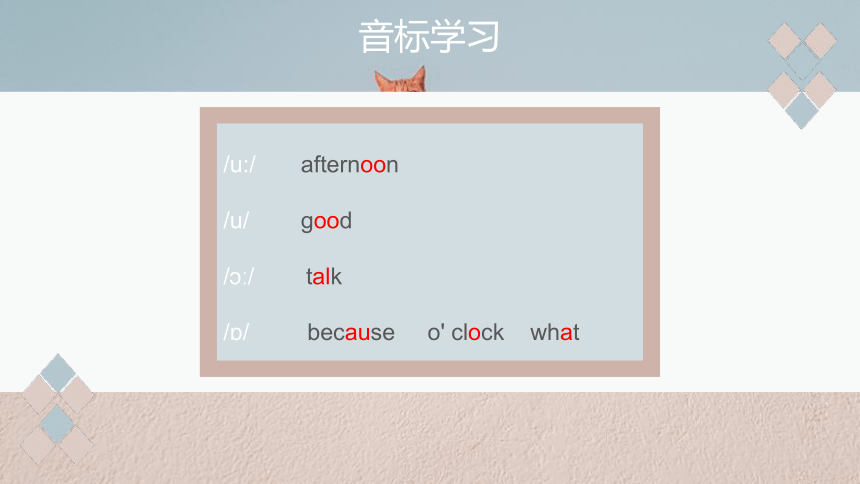

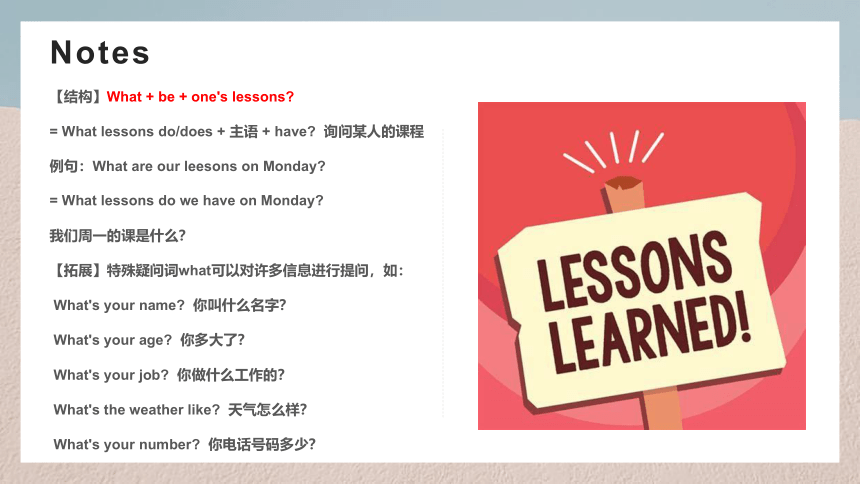
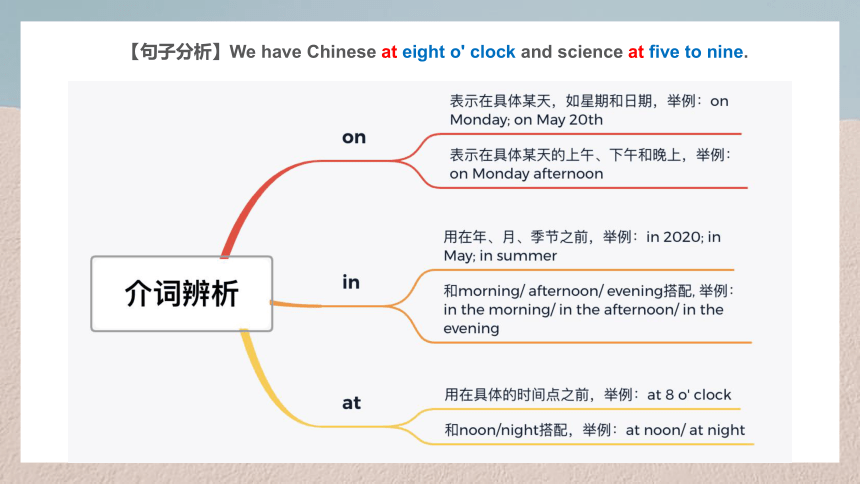
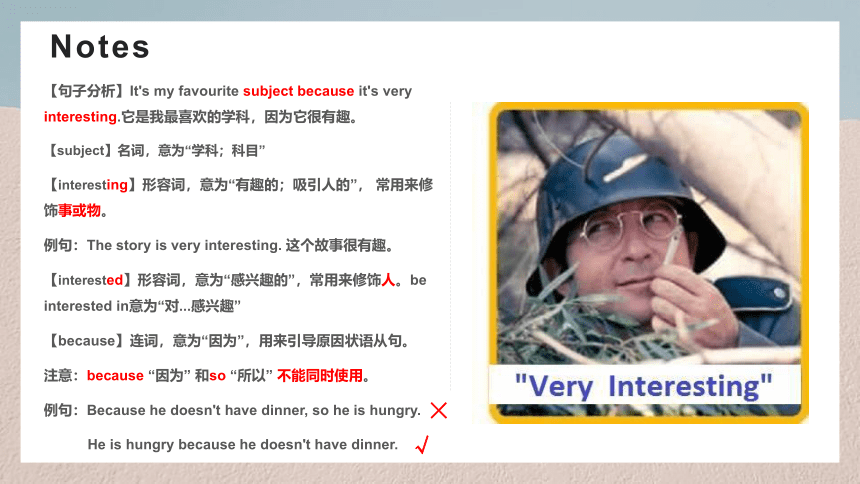
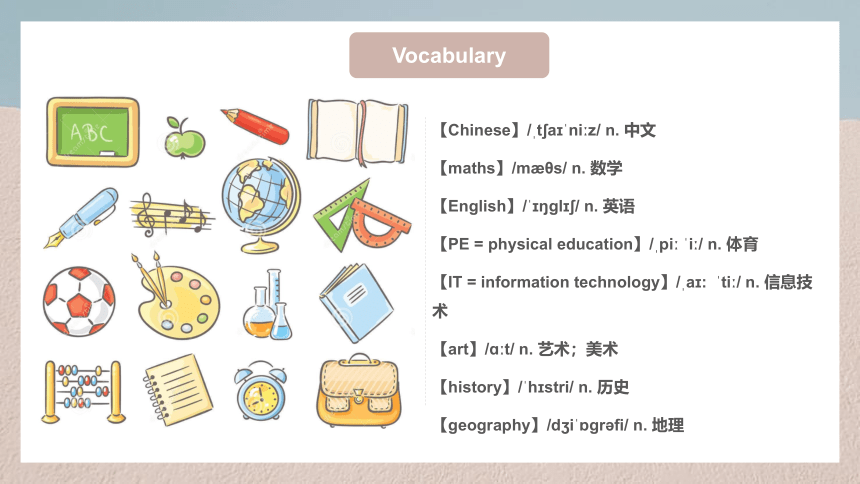
文档简介
(共15张PPT)
Module 5 Review
My school day
/u:/ afternoon
/u/ good
/ / talk
/ / because o' clock what
音标学习
1 I love history.
【结构】What + be + one's lessons
= What lessons do/does + 主语 + have 询问某人的课程
例句:What are our leesons on Monday
= What lessons do we have on Monday
我们周一的课是什么?
【拓展】特殊疑问词what可以对许多信息进行提问,如:
What's your name 你叫什么名字?
What's your age 你多大了?
What's your job 你做什么工作的?
What's the weather like 天气怎么样?
What's your number 你电话号码多少?
Notes
【句子分析】We have Chinese at eight o' clock and science at five to nine.
Notes
【句子分析】It's my favourite subject because it's very interesting.它是我最喜欢的学科,因为它很有趣。
【subject】名词,意为“学科;科目”
【interesting】形容词,意为“有趣的;吸引人的”, 常用来修饰事或物。
例句:The story is very interesting. 这个故事很有趣。
【interested】形容词,意为“感兴趣的”,常用来修饰人。be interested in意为“对...感兴趣”
【because】连词,意为“因为”,用来引导原因状语从句。
注意:because “因为” 和so “所以” 不能同时使用。
例句:Because he doesn't have dinner, so he is hungry.
He is hungry because he doesn't have dinner.
×
√
【Chinese】/ t a ni z/ n. 中文
【maths】/m θs/ n. 数学
【English】/ ɡl / n. 英语
【PE = physical education】/ pi i / n. 体育
【IT = information technology】/ a : ti / n. 信息技术
【art】/ɑ t/ n. 艺术;美术
【history】/ h stri/ n. 历史
【geography】/d i ɡr fi/ n. 地理
Vocabulary
2 We start work at nine o' clock.
2 We start work at nine o' clock.
【句子分析】I go to school on weekdays, but not on Saturday and Sunday. 我星期一到星期五上学,但星期六和星期天不上学。
【go to school】去上学,该短语中不必加冠词。
Notes
【句子分析】I get up at half past seven in the morning, and then have breakfast. 我早上七点半起床,然后吃早饭。
【get up】 起床 / 【wake up】醒来
Notes
get 短语
【句子分析】I get up at half past seven in the morning, and then have breakfast. 我早上七点半起床,然后吃早饭。
【拓展】时刻的表达
一. 直接表达:小时 + 分钟,如:
7:30 seven thirty 3:50 three fifty
Notes
二. 介词表达
1. 时间在30分钟以内,用“分钟 + past + 小时”
如:6:10 ten past six
2. 时间在30分钟之后,用“相差的分钟 + to + 下一个小时”
如:5:50 ten to six
3. 时间恰好为半小时,用“half past + 小时”
如:11:30 half past eleven
4. 一刻钟 = 15分钟 = a quarter
如:9:15 a quarter past nine 3:45 a quarter to four
5. 表示整点用o' clock, 如:8:00 eight o' clock
6. 表示上午用a.m.; 表示下午用p.m. 如:6.13 a.m. 上午6:13
7. a.m./p.m.不与o' clock同时使用,如
four o' clock in the afternoon 下午四点
【语法】行为动词的一般现在时(一)
【用法】表示经常发生的动作或存在的状态。
【主语是第一人称、第二人称和第三人称复数时的句式变化】
Notes
肯定句 主语 + 行为动词 + 其他 否定句 主语 +do not/ don't + 行为动词原型 + 其他 一般疑问句 Do + 主语 + 行为动词原型 + 其他? 肯定回答 Yes, 主语 + do.
否定回答 No, 主语 + don't.
例句:We have lunch at school. 我们在学校吃午饭。
I don't like science. 我不喜欢科学。
Do you live near here 你住在这附近吗?
3 Language in use
1. __________ is your ID card number
A. What B. Who C. Where D. How
2. I don't like Chinese because it's __________.
A. important B. interesting C. difficult D. great
3. It is _________ to do some reading when you are free.
A. interesting B. interested C. much interesting D. much interested
4. - Do you like geography, Betty - ________, but it's difficult!
A. Yes, I do B. No, I don't C. Yes, I don't D. No, I do
5. - Can you __________ that again, please - Yes, it's a pencil.
A. speak B. spell C. say D. read
A
C
A
A
C
【T5 解析】tell, talk, say, speak都和“说”有关,但区别如下:
tell 意为“告诉”,常接story, lie等,可以接双宾语 常见搭配:tell sb. sth. 告诉某人某事
tell a story 讲故事 / tell a lie 说谎
talk 意为“谈论”,侧重双方交谈,为不及物动词,可与to/with/about等介词连用 常见搭配:talk to/with sb. 和某人说话
talk about sth. (with sb.) (和某人)谈论某事
say 意为“说”,强调说的内容 常见搭配:say sth.
speak 意为“讲话”,侧重会议演讲、讲语言等 常见搭配:speak English
Module 5 Review
My school day
/u:/ afternoon
/u/ good
/ / talk
/ / because o' clock what
音标学习
1 I love history.
【结构】What + be + one's lessons
= What lessons do/does + 主语 + have 询问某人的课程
例句:What are our leesons on Monday
= What lessons do we have on Monday
我们周一的课是什么?
【拓展】特殊疑问词what可以对许多信息进行提问,如:
What's your name 你叫什么名字?
What's your age 你多大了?
What's your job 你做什么工作的?
What's the weather like 天气怎么样?
What's your number 你电话号码多少?
Notes
【句子分析】We have Chinese at eight o' clock and science at five to nine.
Notes
【句子分析】It's my favourite subject because it's very interesting.它是我最喜欢的学科,因为它很有趣。
【subject】名词,意为“学科;科目”
【interesting】形容词,意为“有趣的;吸引人的”, 常用来修饰事或物。
例句:The story is very interesting. 这个故事很有趣。
【interested】形容词,意为“感兴趣的”,常用来修饰人。be interested in意为“对...感兴趣”
【because】连词,意为“因为”,用来引导原因状语从句。
注意:because “因为” 和so “所以” 不能同时使用。
例句:Because he doesn't have dinner, so he is hungry.
He is hungry because he doesn't have dinner.
×
√
【Chinese】/ t a ni z/ n. 中文
【maths】/m θs/ n. 数学
【English】/ ɡl / n. 英语
【PE = physical education】/ pi i / n. 体育
【IT = information technology】/ a : ti / n. 信息技术
【art】/ɑ t/ n. 艺术;美术
【history】/ h stri/ n. 历史
【geography】/d i ɡr fi/ n. 地理
Vocabulary
2 We start work at nine o' clock.
2 We start work at nine o' clock.
【句子分析】I go to school on weekdays, but not on Saturday and Sunday. 我星期一到星期五上学,但星期六和星期天不上学。
【go to school】去上学,该短语中不必加冠词。
Notes
【句子分析】I get up at half past seven in the morning, and then have breakfast. 我早上七点半起床,然后吃早饭。
【get up】 起床 / 【wake up】醒来
Notes
get 短语
【句子分析】I get up at half past seven in the morning, and then have breakfast. 我早上七点半起床,然后吃早饭。
【拓展】时刻的表达
一. 直接表达:小时 + 分钟,如:
7:30 seven thirty 3:50 three fifty
Notes
二. 介词表达
1. 时间在30分钟以内,用“分钟 + past + 小时”
如:6:10 ten past six
2. 时间在30分钟之后,用“相差的分钟 + to + 下一个小时”
如:5:50 ten to six
3. 时间恰好为半小时,用“half past + 小时”
如:11:30 half past eleven
4. 一刻钟 = 15分钟 = a quarter
如:9:15 a quarter past nine 3:45 a quarter to four
5. 表示整点用o' clock, 如:8:00 eight o' clock
6. 表示上午用a.m.; 表示下午用p.m. 如:6.13 a.m. 上午6:13
7. a.m./p.m.不与o' clock同时使用,如
four o' clock in the afternoon 下午四点
【语法】行为动词的一般现在时(一)
【用法】表示经常发生的动作或存在的状态。
【主语是第一人称、第二人称和第三人称复数时的句式变化】
Notes
肯定句 主语 + 行为动词 + 其他 否定句 主语 +do not/ don't + 行为动词原型 + 其他 一般疑问句 Do + 主语 + 行为动词原型 + 其他? 肯定回答 Yes, 主语 + do.
否定回答 No, 主语 + don't.
例句:We have lunch at school. 我们在学校吃午饭。
I don't like science. 我不喜欢科学。
Do you live near here 你住在这附近吗?
3 Language in use
1. __________ is your ID card number
A. What B. Who C. Where D. How
2. I don't like Chinese because it's __________.
A. important B. interesting C. difficult D. great
3. It is _________ to do some reading when you are free.
A. interesting B. interested C. much interesting D. much interested
4. - Do you like geography, Betty - ________, but it's difficult!
A. Yes, I do B. No, I don't C. Yes, I don't D. No, I do
5. - Can you __________ that again, please - Yes, it's a pencil.
A. speak B. spell C. say D. read
A
C
A
A
C
【T5 解析】tell, talk, say, speak都和“说”有关,但区别如下:
tell 意为“告诉”,常接story, lie等,可以接双宾语 常见搭配:tell sb. sth. 告诉某人某事
tell a story 讲故事 / tell a lie 说谎
talk 意为“谈论”,侧重双方交谈,为不及物动词,可与to/with/about等介词连用 常见搭配:talk to/with sb. 和某人说话
talk about sth. (with sb.) (和某人)谈论某事
say 意为“说”,强调说的内容 常见搭配:say sth.
speak 意为“讲话”,侧重会议演讲、讲语言等 常见搭配:speak English
同课章节目录
- Starte
- Module 1 My teacher and my friends
- Module 2 My English lesson
- Module 3 My English book
- Module 4 My everyday life
- Module 1 My classmates
- Unit 1 Nice to meet you.
- Unit 2 I'm Wang Lingling and I'm thirteen years ol
- Unit 3 Language in use.
- Module 2 My family
- Unit 1 Is this your mum?
- Unit 2 These are my parents.
- Unit 3 Language in use.
- Module 3 My school
- Unit 1 There are thirty students in my class.
- Unit 2 The library is on the left of the playgroun
- Unit 3 Language in use.
- Module 4 Healthy food
- Unit 1 We've got lots of apples.
- Unit 2 Is your food and drink healthy?
- Unit 3 Language in use.
- Module 5 My school day
- Unit 1 I love history.
- Unit 2 We start work at nine o'clock.
- Unit 3 Language in use.
- Revision module A
- Module 6 A trip to the zoo
- Unit 1 Does it eat meat?
- Unit 2 The tiger lives in Asia.
- Unit 3 Language in use.
- Module 7 Computers
- Unit 1 How do I write my homework on the computer?
- Unit 2 When do you use a computer?
- Unit 3 Language in use.
- Module 8 Choosing presents
- Unit 1 I always like birthday parties.
- Unit 2 She often goes to concerts.
- Unit 3 Language in use.
- Module 9 People and places
- Unit 1 We're enjoying the school trip a lot.
- Unit 2 They're waiting for buses or trains.
- Unit 3 Language in use.
- Module 10 Spring Festival
- Unit 1 Are you getting ready for Spring Festival?
- Unit 2 My mother's cleaning our houses and sweepin
- Unit 3 Language in use.
- Revision module B
